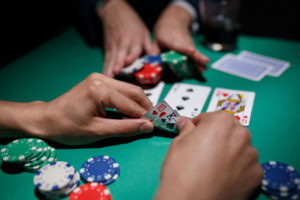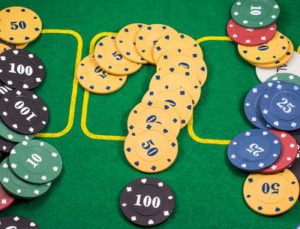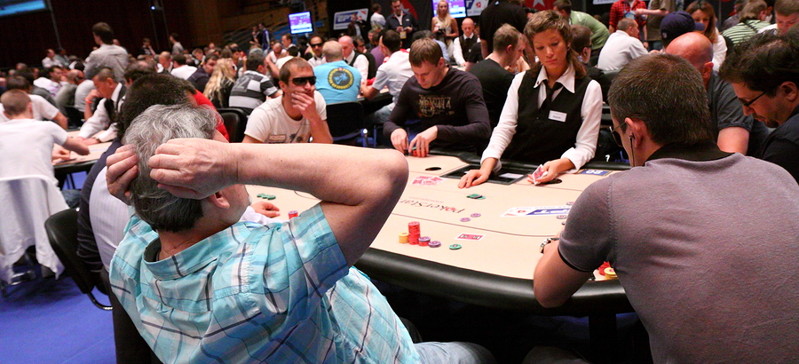 If you ask any player what the most important aspect of poker is, many will tell you that it is getting your strategy right. This seems simple enough, but the fact is that there are many different strategies depending on the type of game you are in, the situation of that game and whether you are playing in a cash game or tournament game.
If you ask any player what the most important aspect of poker is, many will tell you that it is getting your strategy right. This seems simple enough, but the fact is that there are many different strategies depending on the type of game you are in, the situation of that game and whether you are playing in a cash game or tournament game.
This can be confusing for players who are new to poker, but if you look at the different strategies for the games you play and try to keep away from the others for now, this will certainly help. The strategies we are going to talk about today are based on tournaments.
There are two types of tournaments that players get involved with, these are single table tournaments and multi table tournaments. Both need a different strategy for you to be successful, so here is a look at how you would play both of these and the differences between your play.
Single Table Tournament v Multi Table Tournament
 The first thing to say here is that single table tournaments are known by two different names, depending on who and where you play poker, you may see both of these. They are known in some places as single table tournaments, or STT for short. However, they are also known as sit and go tournaments, which are called SNG for short.
The first thing to say here is that single table tournaments are known by two different names, depending on who and where you play poker, you may see both of these. They are known in some places as single table tournaments, or STT for short. However, they are also known as sit and go tournaments, which are called SNG for short.
What they are, is a shortened tournament, played on one table rather than multiple, so they are much smaller than multi table tournaments. Essentially, both are poker tournaments that you play in to try and win the top prize on offer, but when it comes down to strategy, these two are very different.
Single table games are much shorter, so your tournament is going to be over much faster and for that reason, many players choose to not be as cautious as they would in a multi table tournament. With single table tournaments, you can play many of them in a session if you wish and if they are scheduled, the same cannot be said about multi table events, which take far longer to complete.
An important point to make here is that if you are learning how to play poker and you want to play tournament games then any type of tournament, either single or multi table, will help you. These two do require different strategies and outlooks on the game, but ultimately, you will be able to transfer some of your skills and knowledge between the two different formats and use it well.
Single table tournaments have far less variance involved in them because they are shorter and played by a smaller number of people. However, due to this, the prize on offer is much lower, so if you do win a single table tournament, you may not see much of a reward. Remember, poker prizes come from the players buying into the tournament, so if you have more people playing then the prizes are naturally going to be bigger.
Then there is the difference with what you have to do to finish in the money and pick up some kind of win in these games. In a single table poker tournament, you have to finish in the top 30% of the field if you want a pay out from the game. For those playing in multi-tournament games, you will need to finish inside the top 10% of players to get a pay out.
Essentially, based on these, it is three times harder to get a pay out from a multi table tournament game than it is from a single table game. However, this is balanced out by the fact that the prize pots on offer in multi table tournaments are bigger, so needs factoring into your decisions making when you are working out where to play.
If you like to play more than one poker game at a time then the advice given to players is that you should focus on playing single table tournaments only. If you are a good poker player and have good attention to detail, you should be able to play across multiple tables in single table tournament games. By keeping this to a single table you can see what each player is doing, learn how they play and the flow of the game.
In a multi table tournament, where you are moving around and are going up against different players, this would not be possible and would cause far too much confusion for you to be at your best. If you want to play more than one game, the best advice is to leave multi table tournaments alone, otherwise, you are going to quickly confuse yourself.
Single Table Tournament Poker Strategy
 Getting your strategy right here will not only lead to you being a better and potentially more profitable poker player, but you will also see yourself winning more events too. As mentioned above, in single table games, you need to be in the top 30% to get a return usually from this type of tournament, although every player is of course aiming for the top prize and to come first.
Getting your strategy right here will not only lead to you being a better and potentially more profitable poker player, but you will also see yourself winning more events too. As mentioned above, in single table games, you need to be in the top 30% to get a return usually from this type of tournament, although every player is of course aiming for the top prize and to come first.
With this format of gaming, finding a way to win should always be at the front of your mind. You are on one single table, so can see what is happening around you to every single player taking part. Not only does this mean you can play with a strategy that helps you, but it also means you can play with a strategy that tries to eliminate the players you are up against, particularly those who are looking strong.
There will be a time in the tournament where you have to make your move, either by going all-in or by playing big in a bid to eliminate someone you are up against. This will come around far sooner in a single table tournament, you don’t need to wait for the right opportunity, you should be on the lookout for it from the very start.
Blind size increases quickly in single games too, so your chip stack is going to narrow as the game develops, another reason why many try to attack and make a big move earlier in the game, rather than holding on and waiting. This is of course a matter of finding the right time, you need to know when to fold and not chase, but at the same time, you need to be ready to pounce and be aggressive when it is needed.
There will be a point in the game when the blinds have increased to a level that almost forces you to play on, rather than folding because you are risking more of your chips in the hand. This is not something we really see in multi table tournaments, but certainly something that plays a big role in single table games.
When playing these games, the feeling is that there is a little more at stake and this comes because the pace is higher than in other tournament games. You will find yourself playing more here, and your decision making in key hands will more than likely either give you a chance to win or take that away.
If you work well under pressure, you are likely to be able to handle single table games, but if you don’t then you may struggle as this is a trait that is seen in the best single table players.
Multi Table Tournament Poker Strategy

There is a lot more variance in multi table tournaments, and although you do not face the same pressured environment as you do in a single table game, there is a lot thrown at players in this version.
You will deal with things that single table players do not see, a lot of blind level increases, a big change in flow, a table move, and of course your positioning in the game. You may go from dominating one table to being the player on the next who has the least amount of chips, and you need to know how to adapt to that.
If single table tournaments are all about being aggressive and taking any opportunity that comes your way, multi table tournaments are all about how you adapt to situations as a player. Just as you are getting a feel for your table and understand what is happening, you will be thrown into a completely different environment and you will have to quickly adapt to that.
If you have the ability to adjust and change in line with the game, you are certainly going to increase your chances of winning these types of games. You also need a longer thought process, single table tournaments need an urgency from players, while you can play the long game here and wait for your time to strike.
Perhaps the best way to end off is to compare the two games to running. A single table tournament is similar to a sprint, you need to be explosive from the start and put everything into a short burst, so be prepared for bigger bets and potentially going all in at a very early stage.
A multi table tournament is much slower than that and similar to a marathon. Rather than starting fast, you know you have a long road ahead and the key to this is setting an even pace and being able to maintain it at some point. T
There will be a finishing kick needed at the end, but there is a long distance to go before that, which is all about taking very few risks and trying to put yourself in with a winning chance when you do eventually get to the end of the race.
